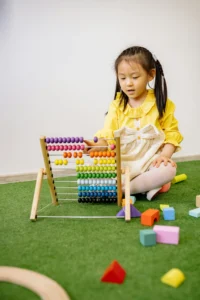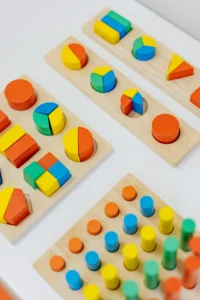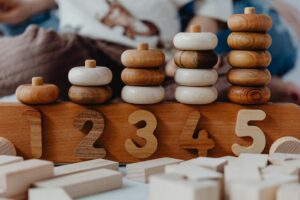“Am I missing out if my child isn’t enrolled in right brain development classes?” It’s a question many parents ask themselves, especially when they scroll through reels of genius toddlers solving puzzles, reading early, or painting like prodigies. The fear creeps in- “Are other kids ahead?” “Am I doing enough?” “Should I sign up for those right brain development...
How To Make Math Fun And Engaging For Young Kids
Mathematics often has a bad reputation, even among adults. But the truth is, when introduced in the right way, math can be exciting, creative, and even joyful. For young children, especially between the ages of 2 and 6, early exposure to math fun for kids can build a strong foundation, improve problem-solving skills, and eliminate the fear commonly associated with the subject. If you’re wondering how to cultivate this love for numbers, here’s a comprehensive guide on how to make math fun for kids and foster a lifelong appreciation for learning.
Math Anxiety Starts Early. Here’s How to Prevent It
You might think math anxiety only sets in during high school algebra or tricky geometry lessons. But research shows that children as young as 5 can experience math-related stress. This anxiety often stems from negative experiences, pressure to perform, or a lack of confidence. The good news? Parents and educators can prevent this early fear by making math fun for kids through playful, low-pressure learning experiences.
Instead of drilling equations or focusing solely on right or wrong answers, encourage exploration and experimentation. Normalize mistakes and frame them as learning opportunities. A young child who learns that math is a game of patterns, logic, and storytelling will grow up seeing numbers as allies, not enemies.
Learning Through Play = Better Retention

Play is not just a pastime. It’s how children learn best. Neuroscience confirms that kids retain more when they’re emotionally engaged, moving, laughing, and actively participating. This makes learning math through games and activities far more effective than worksheets or memorization.
Integrating maths fun games for kids into their daily routine nurtures curiosity and improves memory retention. Whether it’s a sorting game, a playful competition, or an app with engaging visuals and rewards, play makes concepts stick. Simply put, if it’s fun, it works.
Simple Strategies to Make Math Fun for Kids

Use Everyday Examples
Math is everywhere: in your kitchen, your car, your shopping cart. Use everyday moments to point out numbers, patterns, and comparisons.
- While grocery shopping: “We need 6 apples. We already have 2. How many more?”
- During cooking: “Let’s pour half a cup of milk. What’s half of a cup?”
These everyday scenarios transform into maths fun activities for kids that build real-world application and critical thinking.
Storytelling with Numbers
Children love stories. Why not make numbers part of them? Instead of saying “2 + 3 = 5,” try this: “Two sleepy bears went into a cave. Later, three more joined. How many bears are snoring now?”
Using imagination and narrative to build emotional connections to abstract ideas, a powerful way to make math fun for kids.
Celebrate Small Wins
Confidence is key. Every time your child counts correctly, identifies a shape, or solves a simple puzzle, celebrate it. Stickers, high-fives, or a proud affirmation can turn learning into a reward-rich experience.
Top Math Games & Toys for Home Learning

Toys are learning tools in disguise. Here are the best options to make math fun for kids at home:
Counting Bears & Sorting Kits
These colorful manipulatives help children understand patterns, quantities, and classification. They’re ideal for early learners who benefit from tactile interaction.
Magnetic Number Boards
Place these on the fridge or a whiteboard to turn idle moments into playful practice. Match numbers to dots, add magnetic shapes, or create equations.
Math Bingo and Card Games
Combine excitement with learning using maths fun games for kids like Math Bingo, Uno, or Number Snap. These sharpen mental math and memory.
Puzzle-Based Toys (Tangrams, Shape Sorters)
Tangrams develop spatial awareness and geometry skills, while shape sorters build recognition and fine motor control, both key to early maths fun activities for kids.
Board Games like Chutes & Ladders
Classic board games introduce counting, sequencing, and logic. These cooperative games also teach turn-taking and patience, all in a math-rich context.
Building Blocks (LEGO, Pattern Tiles)
Blocks teach symmetry, measurements, problem-solving, and basic addition. Ask your child to count pieces, match colors, or create repeating patterns.
Age-Wise Math Play Tips (Ages 2–6)
Ages 2–3 (Toddlers)
- Focus on sensory and motor skills: Touch and feel counting books, soft dice, and stacking cups.
- Count aloud during everyday routines: “Let’s put on 1 sock… and another! That’s 2 socks!”
- Introduce size and comparison: Big vs small, tall vs short.
Ages 3–4 (Preschoolers)
- Play matching and sorting games using household items.
- Introduce simple board games with dice and number recognition.
- Use songs and rhymes with numbers: “Five Little Monkeys,” “Ten in the Bed.”
Ages 5–6 (Kindergarten & Early Primary)
- Start simple addition and subtraction with objects and stories.
- Encourage estimation and prediction: “How many steps to the door?”
- Explore basic time-telling, days of the week, and calendar use.
All of these activities serve as enjoyable and impactful maths fun activities for kids, tailored to their developmental stage.
Conclusion: Turn Everyday Moments Into Math Magic
When we reframe math as a tool to explore the world, not just a subject to pass, children respond with curiosity and joy. The kitchen becomes a classroom. A bedtime story becomes a math puzzle. With creativity and consistency, we can make math fun for kids a reality.
Focus on connection over perfection. Build habits, not pressure. And remember, the goal isn’t to raise the next mathematician. It’s to raise confident, curious problem-solvers who aren’t afraid of numbers.
By choosing the right maths fun games for kids, integrating maths fun activities for kids into daily life, and celebrating each small success, you’re not just teaching math, you’re opening up a lifelong love for learning.
So go ahead, count clouds, build towers, and roll the dice. Because when learning feels like play, children don’t just learn more, they love more, too.

